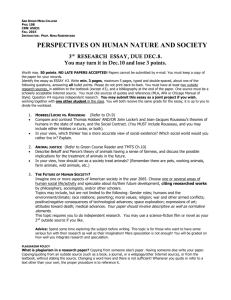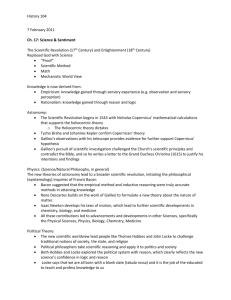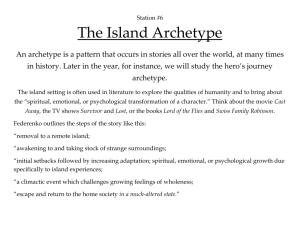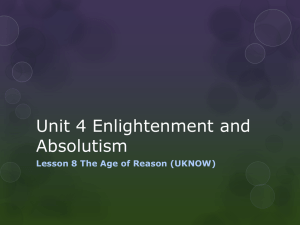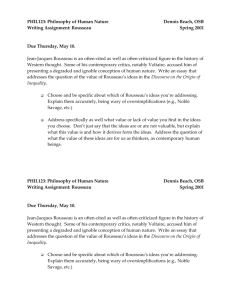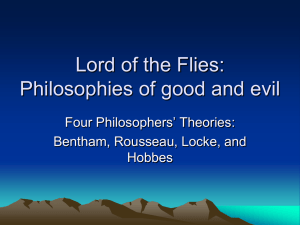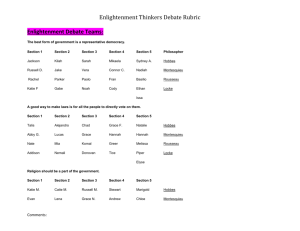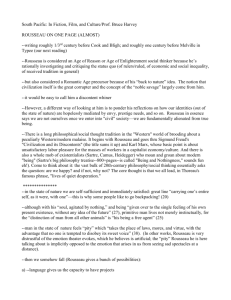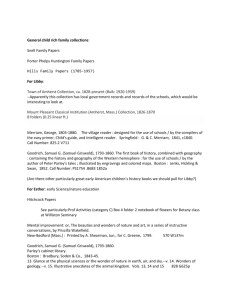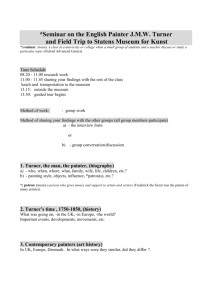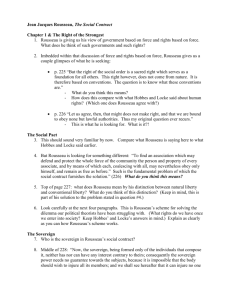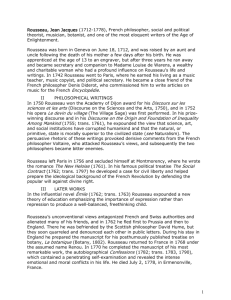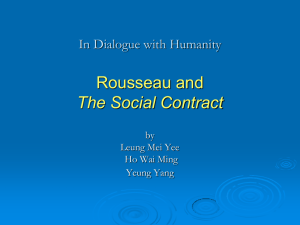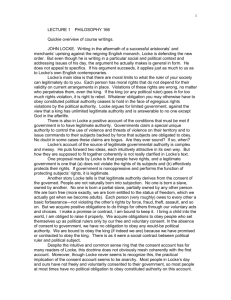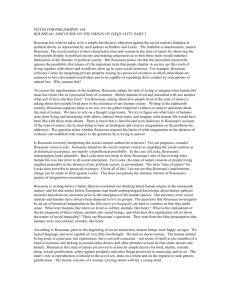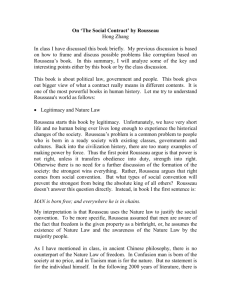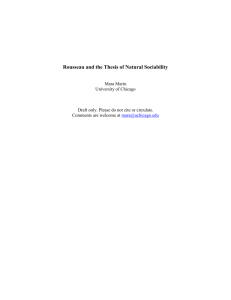The Social Contract
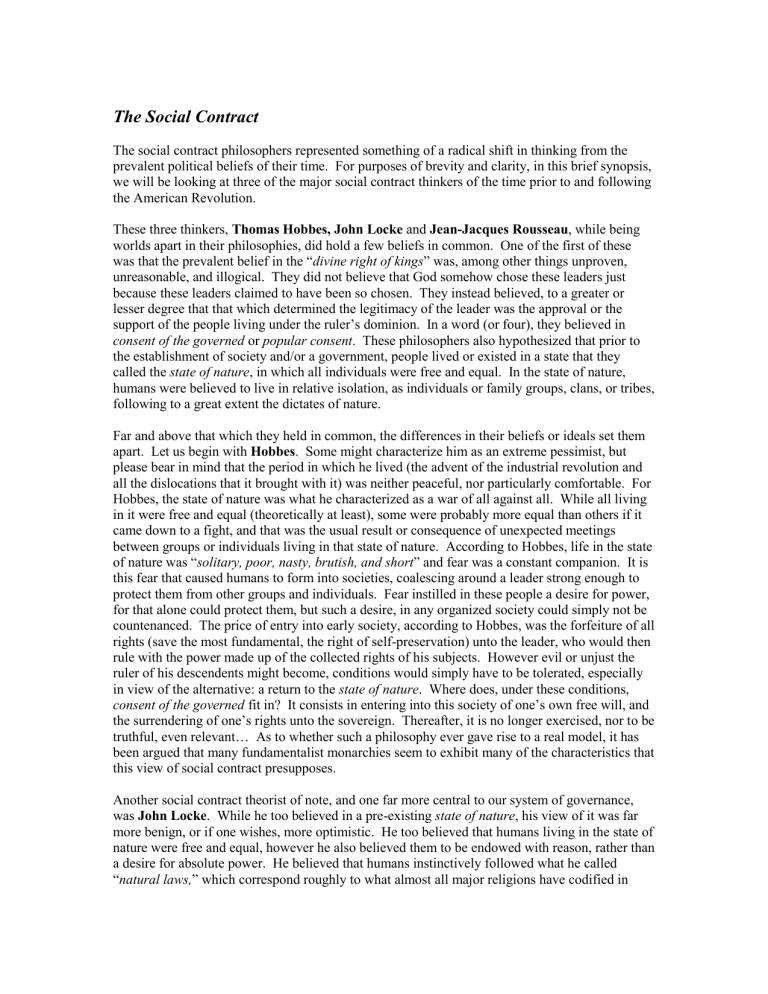
The Social Contract
The social contract philosophers represented something of a radical shift in thinking from the prevalent political beliefs of their time. For purposes of brevity and clarity, in this brief synopsis, we will be looking at three of the major social contract thinkers of the time prior to and following the American Revolution.
These three thinkers, Thomas Hobbes, John Locke and Jean-Jacques Rousseau , while being worlds apart in their philosophies, did hold a few beliefs in common. One of the first of these was that the prevalent belief in the “ divine right of kings ” was, among other things unproven, unreasonable, and illogical. They did not believe that God somehow chose these leaders just because these leaders claimed to have been so chosen. They instead believed, to a greater or lesser degree that that which determined the legitimacy of the leader was the approval or the support of the people living under the ruler’s dominion. In a word (or four), they believed in consent of the governed or popular consent . These philosophers also hypothesized that prior to the establishment of society and/or a government, people lived or existed in a state that they called the state of nature , in which all individuals were free and equal. In the state of nature, humans were believed to live in relative isolation, as individuals or family groups, clans, or tribes, following to a great extent the dictates of nature.
Far and above that which they held in common, the differences in their beliefs or ideals set them apart. Let us begin with Hobbes . Some might characterize him as an extreme pessimist, but please bear in mind that the period in which he lived (the advent of the industrial revolution and all the dislocations that it brought with it) was neither peaceful, nor particularly comfortable. For
Hobbes, the state of nature was what he characterized as a war of all against all. While all living in it were free and equal (theoretically at least), some were probably more equal than others if it came down to a fight, and that was the usual result or consequence of unexpected meetings between groups or individuals living in that state of nature. According to Hobbes, life in the state of nature was “ solitary, poor, nasty, brutish, and short
” and fear was a constant companion. It is this fear that caused humans to form into societies, coalescing around a leader strong enough to protect them from other groups and individuals. Fear instilled in these people a desire for power, for that alone could protect them, but such a desire, in any organized society could simply not be countenanced. The price of entry into early society, according to Hobbes, was the forfeiture of all rights (save the most fundamental, the right of self-preservation) unto the leader, who would then rule with the power made up of the collected rights of his subjects. However evil or unjust the ruler of his descendents might become, conditions would simply have to be tolerated, especially in view of the alternative: a return to the state of nature . Where does, under these conditions, consent of the governed fit in? It consists in entering into this society of one’s own free will, and the surrendering of one’s rights unto the sovereign. Thereafter, it is no longer exercised, nor to be truthful, even relevant… As to whether such a philosophy ever gave rise to a real model, it has been argued that many fundamentalist monarchies seem to exhibit many of the characteristics that this view of social contract presupposes.
Another social contract theorist of note, and one far more central to our system of governance, was John Locke . While he too believed in a pre-existing state of nature , his view of it was far more benign, or if one wishes, more optimistic. He too believed that humans living in the state of nature were free and equal, however he also believed them to be endowed with reason, rather than a desire for absolute power. He believed that humans instinctively followed what he called
“ natural laws, ” which correspond roughly to what almost all major religions have codified in
some form or another (the 10 Commandments, for example, in the Christian realm…) In addition to this, he believed that humans, generally speaking, are social beings rather than solitary brutes, and tend to come together in societies almost instinctively. In his world-view, governments arise in a two-step process, in which first a society forms, and then the participants in this society come together to elect, or put together a government on the basis of elections. (Let it be clear, however, that not everyone was to be an elector in this system. That privilege belonged solely to propertyowners, as stakeholders in the government to be created. Clearly, what Locke was pushing was not direct, but rather indirect democracy, or in other words, a republic based upon representatives elected by the electors.) As participants entered into society on a voluntary and reasoned basis,
Locke believed that they should not be forced or asked to give up all of their rights, but rather that humans had natural rights which the society and the leader of the government of that society has to respect and protect. The government thus constituted is tasked by Locke to protect life, liberty and property , and operates under the caution that if it does not protect those, and does not act justly, it runs the risk of being overthrown in favor of another government or leadership that does.
Locke believed in the separation of powers (though the idea did not originate with him, but rather with Montesquieu), ideally among three branches (legislative, executive, and judicial), but a fused legislative-executive (English, parliamentary model) was also considered acceptable if unavoidable. He also believed in the necessity of pluralism (which would allow groups to get together and have some access to the policy-making process in order to redress grievances and protect the rights of the minority from majority tyranny) within his governmental ideal. The
American Revolution was to no little extent predicated upon Locke’s ideals, and his appears to have been largely the model followed by the framers of the Constitution in setting up that which became the United States of America.
Another, and probably the most advanced social contract theorist, is mentioned in passing in our textbook, but not given anything like his proper due. I am referring here to Jean-Jacques
Rousseau
, known to many as the “
Father of True Democracy.
” For Rousseau, the state of nature was something of an idyllic concept. Unlike his predecessors, who largely based their concept of the state of nature upon a mix of speculation and intuition, Rousseau sought to base his understanding of the state of nature upon an existing example. The example he chose was that of the Native Americans inhabiting the Eastern Seaboard. From them he took his concept of the
"Noble Savage" living in harmony with-, and on the land. Of people living in the state of nature,
Rousseau assumed them to be amoral (not immoral) and asocial (not antisocial), but the innate characteristic that he believed them to be possessed of, was compassion for others. According to his view, people come together to form societies, not out of fear or innate sociability, but rather to overcome whatever obstacles nature might throw in their way. (A typical example would be
China, with its wet-rice cultivation, which necessitates extensive irrigation, and presumably highly developed societies to provide the labor necessary to construct such irrigation systems.)
Rousseau believed that people coming together, voluntarily, in such a manner, should not need to abandon any rights to an outside sovereign. Rousseau, in fact, considered that alienating one’s rights, was the true mark of a fool. Indeed if citizens are to keep all their rights, they do not even need a sovereign to rule over them, but rather Rousseau believed that the best way for such people to live would be on the basis of direct democracy, in which all concerned would make amongst themselves the rules by which their lives would be bound. Rousseau considered such an enterprise to be neither particularly difficult, nor particularly time-consuming, because he believed that people living in communities of the proper size for direct democracy would naturally understand the wishes, and the needs of others, and through the process of consensus would be able to accommodate such issues. He did not believe that an extensive set of ground rules would need to be accumulated to keep the system in line, but through cooperation and compassion the general will of the people would gradually permeate the community and give it cohesion. Should anyone feel overly uncomfortable with such a way of life, a return to the state
of nature was always an open option. As for the state, if such an entity were to develop,
Rousseau believed that such a thing could and should be a positive entity. The only acceptable state would by its very nature be rather intrusive, but would have for its goal primarily caring for and helping its citizens. It would not allow either homelessness, or hunger, or ignorance to overtake its people, but rather would endeavor to share resources so that all members of society would be provided for. Also, it would allow its citizens to be the most they could be by allowing them to cultivate their compassion for others, and providing the means by which citizens could render service to one another. This for Rousseau was something of an early form of selfactualization, inasmuch as he believed the core characteristic of humans to be their basic compassion rather than greed. (Yes, well so he was a dreamer, but of such dreams is greatness made…) Rousseau was considered by many to be one of the first of a line of communitarian thinkers, and is seen by many as a proto-socialist. His dedication to equality has been seen as the origin of much of the welfare thinking of many modern democracies, in which the state is seen as an entity, which not only can, but indeed should, take care of its citizens, rather than ignore them and leave them to their fate.
I hope that this discursion, overly long though it may have been, will give you a broader and deeper understanding of some of the implications of social contract thinking, than was provided by the book. It is a rich source of understanding of many of our traditions, and a great deal of the governmental overlay, under which we live today.

